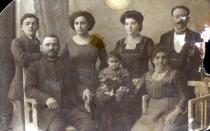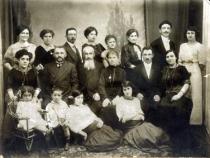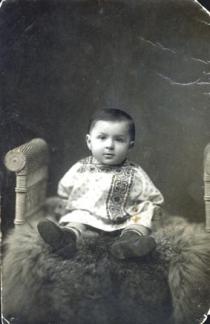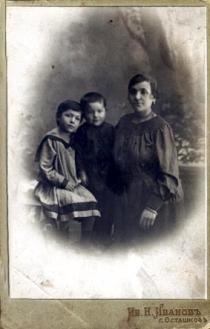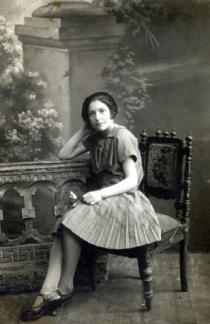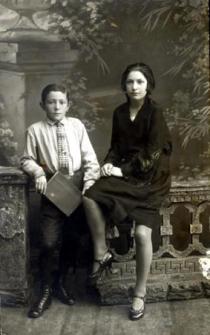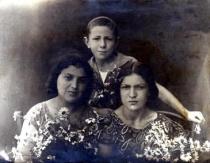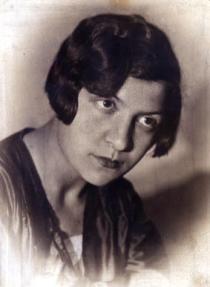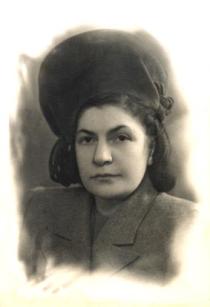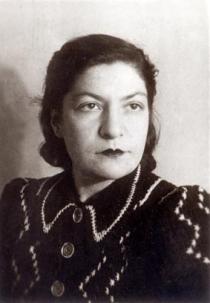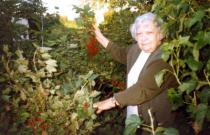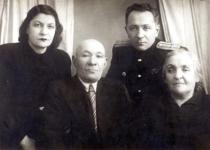
Pessya Sorkina
St. Petersburg
Russia
Interviewer Anna Shubaeva
Pessya Solomonovna is above 90 years of age, but she seems to be not isolated from the world, as it frequently happens to people of her age. She is interested in everything around her. For example, she asked me about my life, my studies. All her life long Pessya Solomonovna was an all-sufficient person, and she did not change in her old age.
During out first meeting Pessya Solomonovna was very vigorous, despite her injured leg. But unfortunately (as it often happens to people of her age) very soon her health took a turn for the worse and she joined the angels.
I know nothing about my great-grandmothers and great-grandfathers. I even do not know where they were born. I only know my grandmothers and grandfathers.
My mother’s parents’ names were Sara Isaakovna and Shmul Yuda. I do not remember the way people called them in Russian 1. My maternal grandmother died in 1933 at the age of eighty three or eighty four. So what year was she born then? We can count. I guess it happened in 1850. My mother's father died earlier and was buried in Ostashkov [a town in Russia founded in 1770; it is situated 190 km far from Tver.] We do not know where his grave is. And my grandmother Sara is buried here in Petersburg on the Jewish Preobrazhenskoe cemetery [the Jewish part of the Preobrazhenskoe cemetery in St. Petersburg was opened in 1875]. I visit her grave often.
My father’s parents lived in Belarus in Boychekovo shtetl [a village near Vitebsk]. I do not remember if they died before the war or during it.
My maternal grandparents knew Russian. And of course they spoke Yiddish. They lived in Riga, there my Mom got married, and there I was born. By the beginning of the war all our relatives appeared (some of them came earlier) in Russia. We settled near Ostashkov, at the railway station Peno. [Peno is a settlement near the Volga River]. I went to school there. I remember a saw-mill situated nearby. We also often visited Polotsk [an ancient city in Vitebsk region of Belarus].
I am sure that I have wedding photographs of both my maternal and paternal grandparents. I keep them somewhere. My father’s father was a very handsome man. And grandmother, his wife was an ugly monkey. I remember my paternal grandfather well. And Mom was rather nice…
All of them worked (I mean my grandfathers, because most women did not work at that time). My mother’s father was a timber examiner. In Riga most Jews were engaged in it. And I do not know where my father’s father worked. We visited them in Boychekovo only once. I guess my paternal grandfather occupied some position at the synagogue, I do not remember anything more...
My grandmothers and grandfathers were religious people, of course. I guess at that time most people were religious. We lived at my paternal grandfather in Ostashkov for a long time. There was a synagogue. In day-to-day life they used to wear ordinary clothes, but at the synagogue they certainly put on tallit, dressed in accordance with the rules. I do not remember if grandmother attended the synagogue. And at Peno railway station there was no synagogue, my paternal grandparents were the only Jews there. But they used to go to Ostashkov to visit synagogue, because my grandfather and father were religious.
My Daddy’s name was Solomon Yakovlevich Sorkin. My Mom’s name was Roza Samuilovna Sorkina, nee Rubina.
Daddy worked also in timber sphere (like my maternal grandfather) before his arrival to Leningrad, and Mom was a housewife (women did not work at that time).
My father had got four sisters: two of them lived in Boychekovo [Belarus], one of them in Vitebsk 2, and the fourth one in Riga. I knew two of them who lived in Boychekovo and a sister who lived in Vitebsk. But I know nothing about his sister from Riga: at that time we did not visit them, because Riga was abroad, not Soviet 3.
One of my uncles, my mother's brother lived in Sverdlovsk [founded in 1781, now Ekaterinburg, an administrative center of Sverdlovsk region], another one lived in Mogilev [a city in Belarus], her third brother lived here in St. Petersburg. My mother's younger sister lived in Moscow. And her elder sister got married and left for America, when I was a little girl. Now I am very sorry that I know nothing about her family. My niece (she is a teacher of English language) comes to my place and reproaches me: ‘You do not know their address!’ You see, I worked at a secret military factory, therefore it was impossible for me to correspond with a person from America 4. I had their photographs, but we hid them somewhere: at that time we were afraid that NKVD 5 officers would come suddenly: you know, the age was gravid. At present I cannot find their photographs… I guess, they have already died, and their children, too. Unfortunately I do not remember their surname.
Peno railway station was a little settlement. There was a saw-mill, but I can’t recall it very well. I remember only one street where we walked every day. It was in fashion in the provinces to go to the railway station. A long-distance train stopped there every day for 3 minutes. So it looked like a TV show: the train arrived, the passengers looked through the windows. All Peno inhabitants gathered on the platform and walked hither and thither to show their dresses. The train was off and everyone went home. That is why I remember the road very well. In Peno I remember no equals in age.
There we rented a house. It was wooden. I do not remember whether there was electricity supply.
There were no automobiles at that time, we used horses, especially to get from Peno to Ostashkov and back. We usually went along the Peno River. At that time I could not imagine an automobile! For the first time in my life I went by train when we moved to Leningrad.
We never went to restaurants to have dinner. Mom was a culinary expert and she had a housemaid. We ate very well. At that time people did not stint themselves: we ate and drank everything we wanted. And now I know that a lot of food is taboo for me.
Peno railway station where we lived is known as a place where Liza Tchaikina was executed by fascists. [Tchaikina Elizabeth (1918-1941) was a member of partisan group during the Great Patriotic War 6; a Hero of the Soviet Union 7 (posthumously).] At that time we had to spend an hour to get from Peno to Ostashkov, and we had to get to Petersburg by a long-distance train (it came once a day). And now it takes two or three hours to get from Ostashkov to Petersburg by electric train.
My brother and I were at home, we did not attend kindergartens. Mom took care of us. When we lived in Peno, a teacher came to teach us at home. Later we together with my brother lived at our grandmother and grandfather in Ostashkov, and Mom and Daddy remained in Peno.
In Ostashkov grandmother and grandfather also rented a house (like we did in Peno). The house had an attic, where we lived together with my brother. In our room there were a table and two beds. And Mom and Daddy lived in Peno, they used to visit us. I remember that they usually brought presents for us: sweets, cookies. We knew that the train arrived once a day. Parents had to go from the railway station to our place by a cab (about three kilometers). We heard the patter of hoofs and understood that they arrived! They brought us presents! I remember that we shared the sweets with my brother. I usually hid my portion under my pillow and he ate everything immediately and worried at me to give him my sweets. At that time cookies and sweets were shaped in a very interesting way. I remember cookies with faces of twofaced Janus: one side was smiling and the other one crying. But you see, all this happened million years ago…
We came to Ostashkov to study at school and started from the 3rd from. By the way in our class I was the shortest and the youngest. And the rest pupils were older and much taller than me. I told you already that we started our school studies in Peno: a teacher came to our place to teach us, because there was no school there. I remember that we studied some foreign language (German or French: English was not in fashion).
I guess we arrived in Ostashkov in 1920. I remember that I finished 9 classes in 1929. I was fifteen years old when I finished my school, because I started from the 3rd form. My brother finished school the same year though he was three years younger than me.
So, I spent my childhood in Ostashkov, I went to school there. It was an ordinary school, not Jewish. But there were a lot of Jews. At that time I paid no special attention to nationality of the people around me. The school was divided into two steps: three or four classes of primary school and later classes of the so called real school.
When I recollected my school later, it seemed to me very large! And much later (I worked already) a friend of mine received a permit to Ostashkov and took me with her. You know, there I could not find my school: I searched for something like a palace, and it appeared to be a very small building. During our stay in Ostashkov I found the house where we lived: our grandparents, my brother and I. I wept a little weep, recollected our life there... Some unknown people lived there.
At our school there were no circles for pupils. I was not a Komsomol member 8. I had got no artistic abilities. I also could not sing, but at that time it was not in fashion. I see that at present everybody is able to sing, everyone is an actor, while we were far away from it.
I got friends at school and nowhere else. We never behaved like modern young people. Now they live without ceremonies. Here in our communal apartment 9 there live several young people. They bed with others unceremoniously. We were different. I remember at our school there were school desks with tip-up tabletops. I remember that in our class there were several handsome boys. One day two of them tried to lift me up on the desk. I shouted so loudly! I fought against them! I did not want to sit there! And the boys were so handsome! I still remember their names: Arkady Kruglov and Ezhek Efimov. Now you see that our relations were absolutely different. Unfortunately I do not remember what games we played.
I remember that we used to spend our vacations at home (in Peno). We went nowhere else. At that time children never interfered in their parents’ affairs. We never spent evening time together with parents: we went to bed and parents lived their own life. And our grandmother and grandfather in Ostashkov were old, they went to bed early. Together with my brother we usually read books before we went to bed.
Daddy was religious. But he taught his children neither Yiddish, nor religious Tradition.
At home we observed kashrut: meat was cooked separately from dairy, etc. But when we lived at Peno railway station, there was no synagogue. It was necessary to go to Ostashkov by a long-distance train, and then hire a cab to get to the synagogue from the station. So we went there not very often, you understand. And when we lived in Peno, we were the only Jewish family there: it was almost impossible to observe Tradition. At that time there were no manifestations of anti-Semitism around us.
In Ostashkov grandfather and grandmother observed Tradition. They were very religious and celebrated all holidays for sure. At Pesach, I remember, they cleaned all corners of the house and put silver spoons and knives in boiling water according to procedure. We observed Sabbath. Daddy and Mom did it too, but my grandmother and grandfather were especially scrupulous.
In Ostashkov where my paternal grandparents lived, there was a choral synagogue. It was very beautiful. I do not know what kind of the synagogue it was. I also do not know what synagogue is here in Petersburg [the Great Choral Synagogue was built in St. Petersburg in 1869; at present it belongs to Hasidic community].
We arrived in Leningrad in 1930. After our arrival we stopped observing kashrut.
In Leningrad I found job (at that time I was sixteen years old). Mom and Daddy attended synagogue, but Mom seldom visited it. As for me, I went to the synagogue during holidays - it was very interesting to be present at the synagogue during holidays [the St. Petersburg Great Choral Synagogue was closed under the communists, nevertheless at holidays a lot of people gathered there despite the prohibition of authorities].
In Leningrad Daddy was not able to find job according to his profession, therefore he worked at vegetable stores as a storekeeper. Those vegetable stores were usually situated in cellars.
I started working in 1931. At that time there were labor exchanges and it was not easy to find job. I was sixteen years old, and hence I was registered at the labor exchange for teenagers. They assigned me to a job of a copyist at the Electrosila factory. [Electrosila Factory is a Leningrad Corporation for construction of electric machines – one of the largest USSR factories in this sphere.] I managed to learn how to copy when we arrived in Leningrad. We had no place to live, and our relatives in Leningrad could not invite us to their apartment (it was very small). That was why we rented a room for some time. The owner’s son was an engineer, and he taught me copying.
While I was working at the Electrosila factory (I do not remember what year) I entered an evening course of its technical machine-building school. [Technical School in the USSR and a number of other countries was a special educational institution preparing specialists of middle level for various industrial and agricultural institutions, transport, communication, etc.] I finished it and entered the Leningrad College of Aircraft Instrument-Making [it was founded in 1941], evening course again.
My brother was too little when we arrived in Leningrad, but he forged his documents and also entered some technical school. Later he worked as an electrician and entered the Leningrad Industrial College. Later he was sent to the Moscow Air Force Academy as an excellent student and a Komsomol member. [The Moscow Air Force Academy was founded in 1918].
At that time we had no problem entering a college, though we were Jews. At that time there was another problem: it was necessary to be a worker or to have parents-workers. And if your parents were not workers, it was impossible to become a student. I remember that I entered the technical school, studied there two days and was sent down: my Daddy was an employee and I was an employee, too. Next year the rules were changed and I entered the technical school again. And later place of parents’ work became insignificant.
So before the war I worked at the Electrosila factory. In 1937 10 we all quaked with fear when the personnel manager came in: we knew that he was going to get someone’s head blown off. A lot of Jews were fired only because they were Jews. But nobody paid attention to me.
I never changed my name or patronymic. Everybody called me Polina, though actually my name is Pessya Solomonovna (it is written in my passport). You see, I am a daughter of wise Solomon. My coworkers never asked me about my nationality. I know that many of my friends disliked Jews, but we were friends at work, visited each other at home. I guess they did not know that I was Jewish.
I had got many friends, we often visited each other. I remember one girl: we studied in the same college group, our brothers studied together, too. Our brothers served in Tallinn for some period of time (they both were professional soldiers). We remained here in Leningrad. Later she got married, and after her husband’s death moved to Moscow. I often visited her in Moscow, and she did the same visiting Leningrad. Later she left for Israel together with her daughter, and now I am not in touch with her. Possibly she is no more…
When the war 11 burst out, I worked at the Electrosila factory. Authorities immediately sent us to dig entrenchments. We worked in the field near Ropsha [a settlement near Leningrad] when Germans arranged air attack. It was so frightful, that we ran for dear life. Authorities did not want to give us a bus to get home, they wanted us to get back to the field and go on digging. But we all refused and got back home. We were so frightened! The next day I returned to my working place at the Electrosila factory.
I came and found out that my department colleagues had been already evacuated. I rushed here and there, but the last echelon had already left. But who knows what the real fortune is… That last echelon was captured by Germans near Mga [a settlement near Leningrad]. So, if I was among those passengers, I would not sit here and have a talk with you… But nevertheless I wanted to leave the city very much, because I was so much afraid of air attacks.
I remember that Mom worked her connections and placed me to the Carburetor factory which was going to be evacuated. The factory was situated in Volkova Village [a historical district of St. Petersburg in its south-east part]. We collected my clothes and left for the railway station. But that day I did not leave the city again, because that echelon did not start. We came back home. I thought the situation over once again and understood that I was going to leave without Mom and Daddy. I went to the factory and asked to take Mom with us. They agreed. We put Mom’s clothes into my suitcase and left our home. But again we did not leave the city. Then I asked myself why we were going to leave Daddy alone? I went to the factory and asked to take my father with us. I promised that we should take food and water for him with us, etc. At last they agreed. But the next day the echelon did not leave (again!). You see, we did not leave at all, because all the roads were cut by Germans. It was very difficult to bring our things back home from the factory: it took us about a month to carry them part by part, because it became extremely difficult to move around the city. We took a tram, and fifteen minutes later it stopped because of air-raid warnings... In short, we remained in the besieged Leningrad. Years of blockade 12 (1941, 1942) passed away.
And my brother graduated from the Moscow Air Force Academy. He was sent to Kazan [the capital of Tatarstan], so at that time he lived in Kazan. Here in Leningrad people went to evacuation (one family by one), and we did not want to leave: we thought that the devil was already dead, but made a mistake. We got to know about new fortifications around the city and grew alarmed. At that time authorities started evacuation of elderly people. They sent us a notification about evacuation, too. So we left the city in 1943 by train. The train moved across the Ladoga Lake 13. We went in heated goods vans. [A heated goods van was a freight car adapted for transportation of people.] Of course, there were no toilets and it was impossible to jump down, because the train could go on moving at any moment. Therefore we all answered the call of nature under the van, all together. Unfortunately I do not remember the name of the town on our way to the east, where we found good food for the first time.
We reached Kazan, and Daddy got ill right after our arrival. He suffered from diarrhea. I went around Kazan on foot to find my brother. I managed. By that time he had already processed necessary papers for our evacuation by airplane (you see, my brother was a military representative at a large factory!). So we remained in Kazan.
When my brother arrived in Kazan, he had an apartment at his disposal, but after the beginning of the war it became necessary to share apartments with needy people, therefore he gave one of his rooms to some people. Soon after our arrival in Kazan my brother was sent to Kuybyshev [now Samara]. So we remained in Kazan living all together in one room.
I returned to Leningrad in 1946. I found work at the factory of aircraft instruments. I worked there as an engineer. At that time the factory was called Techpribor [one of the oldest enterprises of aircraft instruments founded in 1942]. During some period of time the factory had got no name, but different numbers: 936, later 448, etc. Unfortunately I have already forgotten the other numbers of it.
In Leningrad our room appeared to be occupied. So we had to rent a room and had legal proceedings for the room. We managed to evict our property from its unlawful possessor. And we lived here all together: Mom, Daddy and I.
I told you already that Daddy had got four sisters. Two of them lived in Boychekovo and I knew them. Germans dug them alive during the war. Those Daddy’s sisters decided not to leave Boychekovo for evacuation, because during the World War I (in 1914) German soldiers were billeted on Boychekovo (and in their house, too). Daddy’s sisters thought that Germans in 1941 would be analogous to those ones, but it was a mistake. We never saw them after the end of the war.
One of Daddy’s sisters was evacuated from Vitebsk [now Belarus] to Perm [the city was founded in 1723]. I knew that Daddy’s sister, we were in touch with my cousin brother and sister (her son and daughter) for a long period of time. I guess they have already died.
The 4th father's sister lived in Riga. Together with other Jews they were burnt in the local synagogue. I was not acquainted with her (Riga was abroad), but I know her son. We correspond with him (he is my cousin!). He was the only son of that Daddy’s sister who survived (he was evacuated). The others: brothers, sisters - all of them were burnt in that synagogue. But I did not know them. When my brother was sent to Riga, I started visiting it frequently.
Now my cousin lives in Israel. Recently he called me from Israel and congratulated on the occasion of the New Year.
One of my mother's brothers lived in Sverdlovsk, another one in Mogilev, the 3rd one lived here in Leningrad and died during blockade. One of mother's sisters lived in Moscow. Another sister lived in America (she left there before the beginning of the war).
My mother’s brother (who died during the blockade) had got three sons (my cousins). The elder son was a schoolboy. They left the city for evacuation across the Ladoga Lake by a truck and he froze to death, because he was hungry. And the rest children (a girl and a boy) managed to evacuate. By now they are about eighty years old. The boy left for America, Ohio State. And his sister processed all the necessary documents, but did not go for some reason. Last year she visited her brother in America. She regrets that she has not left for America: it’s good to live there for elderly people (she says).
After Mom’s death in 1953 we remained together with Daddy. He worked for some time, but later he had to stop working because of high blood pressure. He kept the house (cooked, cleaned) and I worked.
And almost every day I ran home from my factory like mad: our neighbors (we lived in a communal apartment) called me that they had sent for ambulance. I rushed home and usually found Daddy attacked by his disease.
We spent summer in a suburb (rented dacha 14) together with Daddy. I remember myself running to the railway station in Vsevolozhsk to catch the electric train and get to my factory in time. In Vsevolozhsk we spent two or three seasons. At that time there were no refrigerators, and I had a special hole in the vegetable garden, where I used to put a box with food. So many interesting things surrounded us! I used to take folding beds with us to dacha: my friends often visited us on days off. I went nowhere. When I was young and Mom and Daddy were alive and fine, I often went to the South of our country. I received many permits to sanatoriums at my factory. I also often visited Riga and Riga seashore. Later I used to go on two-day tourist trips to Belarus, Ukraine (Kiev). I also liked to climb mountains.
Daddy died in 1966.
I never got married officially. I had got a man. At present he would be called my boyfriend. But at that time it had no name. He was lost during the war.
We knew about the situation in Israel when they wanted to close Suez Canal for Jews, about the blitzkrieg 15. In fact we all watch TV and listen to the radio, but most often we do not think it over. In 1971 my cousin left Riga for Israel together with all his family. At that time I worked at a military factory and could not correspond with him (they would have cowed me completely). It was impossible to be in touch with him. And when everything changed 16, we started talking to each other by the telephone. We are still in touch.
I have never been to Israel and it is such a pity! You see, I know that there are very good social houses and it would have been good for me to live there in my old age. Here the situation is absolutely different: one rich person built a social house in Petrogradskaya district [one of the districts of St. Petersburg] and trumpeted it everywhere around Europe! And in Israel old people live in separate apartments, special social workers take care of them, they can hire people (to get help) themselves. I know it for sure from my relatives in Israel.
One of my acquaintances left for Israel and got a job in one of those social houses to look after old people. In the social house people live in separate apartments. And here authorities take apartments of the old people who want to move to a social house. As I understood, in Israel they don’t.
I told my brother that it was a pity I did not manage to buy an apartment. At that time there appeared cooperative societies [the cooperative societies of workers and employees were created in 1958 for construction of apartment houses at their own expense]. A lot of people joined cooperatives, but I didn’t. You see, I considered streets where they constructed those buildings to be situated very far from the city center, and now they appeared to be very close to the center. Everything changed! My brother (he died in 1986) said ‘All people live in the center.’ And I remained. But when you become old, it is not good to live in a separate apartment: if you die nobody will find you. Now I live with neighbors in a communal apartment. They are not bad, but their room is a real hotel (so many people come and leave, come and leave). Though my neighbors are not good, they do not want to drop in my room even if they don’t see me in the kitchen the whole day. Sometimes I ask them to drop in, but they don’t.
My neighbors moved to our apartment in 1970: a family of five! Our kitchen is arranged in the corridor (in our apartment there is no special room for it) and we have got no bathroom. But we live all together in peace and friendship. Since 1970 their family changed: their children gave birth to their children, and they are already adults (a girl of twenty years old and a boy at the age of eighteen). Certainly I try to pay no attention to the crowds in their room.
Of course I had got a lot of different offers to change my room for another one in another district of the city. You see, people appreciate Petrogradskaya district (at present most apartments around us are separate and occupied by the new rich Russians). But I do not want to leave for outskirts of the city: here I have not many visitors, and there I am sure I’ll have none.
Earlier I used to go to a bath-house (we have got no bathroom in our apartment), later I went to my friends’ to take a bath. But they live rather far from me and now it is impossible for me to visit them. Besides something happened to my leg: it is not easy for me to walk. An employee of patronage service of the Hesed Avraham Welfare Center 17 visits me sometimes (I am in the list of their program since 2000). She comes once a week, spends about 2 hours and leaves: she considers her work to be fulfilled. When I ask her to wash the floor, she says ‘I have no time.’
Hesed Center used to give us (pensioners) good food packages. They also took us to the Center by car and it was possible to wash linen there (there were many washing machines in the Center). Later they arranged washing themselves: they took linen from us and brought it back clean, but that program was closed also. I guess, a lot of their programs were closed, because now they are poor: America, Germany, Israel do not help. So the Hesed Center became very poor. Earlier they gave us food packages for holidays for sure, but this time I got nothing for Rosh Hashanah! By the way, the list of their employees is very long!
As I am in the list of the Hesed Avraham Welfare Center (patronage program), visitors from abroad often came to my place. I met a family from Baltimore, rabbis from Chicago. Last year there came a family of 9 from Cleveland! Fortunately I have a bed where they could have a seat. All of them took photos. That family from Cleveland brought meals with them. I told them not to bring wine. Visitors usually bring meals with them (I was told at the Hesed Center not to entertain the visitors with delicacies). Several times they brought me some honey, but I am afraid to eat sweet things: I do not want to fall ill with diabetes.
Long time ago I received food packages from Germany, they were very good. Later I got food packages from the Finnish society Kluch Zhizni (Finnish mission for Jews). Finnish food packages were also very good. They brought packages to my place, but at that time I was younger and was able to go there myself. Now I receive no food packages (the programs were closed).
At present I visit Day-time center at Hesed twice a month: they usually bring us there by bus. There we have breakfast; go to excursions (last time we were in the Russian Museum at the exhibition of Shagal paintings 18). Then we come back to the Center to have dinner and attend a concert. Last time it was a concert devoted to Okudzhava, it was very interesting. [Bulat Okudzhava (1924-1997) was a Soviet and Russian poet, composer, and prose writer; he was one of the brightest representatives of bardic poetry.] And then they bring us home. It is a sort of psychological safety valve for me. Now my leg hurts and I am not sure I will be able to get into the bus next week...
A social worker from the social security agency also visits me once a week. I pay 267 rubles for it. I have to pay 530 rubles for two visits per week. But I decided to pay 267. Today she brought me some butter, 1 kg of potatoes, a bottle of kefir. She serves nine persons. I also pay 240 rubles to the Hesed Center for the patronage worker, who comes to my place and works here about 2 hours. But she does not bring me food. This time she helped me to go out and buy an overcoat for me. Now I still can walk with difficulty, but I am afraid that soon I shall not be able to do it. Then I will be grateful to them for bringing me food and to hell with washing my clothes!
My pension is good and I guess I have deserved it. Recently authorities added some money to pensions instead of certain benefits [it happened in 2005]. You see, last year I went to Moscow free-of-charge and now I cannot… As a result I have 1,650 rubles, and Putin gave us 1,000. In total I have 6,400 rubles (my pension).
In Moscow there lives my niece Natasha (my brother’s daughter) and her stepbrother (an adopted son of my brother), because my brother married a woman with a child. That my nephew visited me on my birthday.
Here in St. Petersburg I have another relative: a son of my second cousin sister. To tell the truth, he helped me to get an opinion of a surgeon regarding my diseased leg. He is a dermatologist. He calls me sometimes. He has got a family (a wife and several children).
Recently my niece and I brought 6 bags of books to the library named after Pushkin 19. The bags were very heavy. I hand over my books to the library at regular intervals: it is impossible to sell them now. Sometimes my visitors (foreigners) ask me ‘What do you usually read?’ I answer that I read love stories. I find them in the library. But now I like crosswords. I buy a magazine (for example, Interesting Crossword). I usually buy two magazines: one of them I give to a friend of mine (she comes to my place and takes it).
This year my niece visited me twice. For the first time she came to visit her friend from Tallinn and came to me. Then she was going to Riga and invited me to visit their place. I agreed and asked her to take me with her on her way back from Riga. But she came from Riga in haste and I had to spend a certain time packing food from my fridge somewhere, therefore I refused.
My brother’s wife is Russian. Her son Eduard (adopted son of my brother) indulged in religion. He is a pensioner at the age of seventy one. At Easter he bought a paskha and went to the church to sanctify the cake. Then he brought it to me to celebrate Easter!
Last year on my birthday my niece Natasha and I went to Kronstadt. [Kronstadt is a fortress on the Kotlin Island in the Baltic sea near St. Petersburg.] I was able to go there! And at present I already see the angel of death.
When I worked, people held me in respect. For my 90th birthday people from my factory came to my place and brought me a congratulatory address, flowers, and verses. They were nine.
I often recollect it. Besides all these congratulatory addresses I keep this newspaper, which everybody pays attention at. It has already faded. There you can see me among my coworkers. They called me Polina. For my 70th birthday they presented me fabric and I made an overcoat. You know, I have been wearing that overcoat more than twenty years!
I remember that when I was young I had only one pair of shoes (sports style plimsolls) and only one dress. I did my best to earn money: copied and drew for money.
When Daddy died in 1966, I was fifty two years old and he was eighty two. Since that day thirty nine years have passed in a blink. We use to plan this and that, but at last we understand that it was nothing, everything is in the past and we are among the has-beens.
